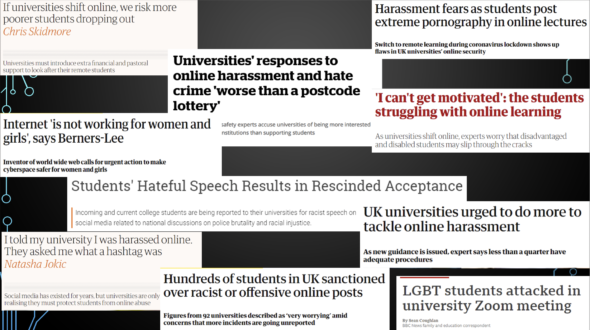Digital Kindness
I originally started this blog post back in November, intending to publish it in time for World Kindness Day (which, rather ominously, fell on Friday the 13th this year), but it ended up on the back burner as other projects took priority and digital fatigue began to set in. I’d wanted to approach the topic of digital kindness, if there might be such a thing, as a colleague had emailed me to say ask if I could develop some resources aimed at helping staff create safe and inclusive online learning environments. We’ve since created a staff development toolkit for this purpose, which will be available in time for semester 2, but the process of researching and writing this guidance has got me thinking a lot about the ways in which we treat each other online.
Sure, I, like many, had to adjust to logging into Microsoft Teams every morning when we started working from home during the pandemic, but communicating with others virtually isn’t exactly new to me. Since my parents have lived on a different continent to me for the past ten years, I’m used to speaking to them through my computer screen, even if we’ve since swapped out Skype for FaceTime. I’ve also been emailing people for almost two decades now and my first foray into online forums was when I was twelve (I really wanted to engage with the now defunct IMDb message boards and share my opinion, which, predictably, led to a lot of arguments with much older people). I can’t imagine I’m the only one who has a long history of engaging with digital technologies on a daily basis. Yet, beyond the digital threats associated with misinformation, fraud, phishing and social engineering, there’s still so much that can go wrong when communicating with other people online even when you mean well. Hopefully our toolkit will make a difference, however small. I’ll link to it once it’s available online.
Digital Fatigue
Part of me thinks the reason people sometimes fail to think before posting something that’s hurtful or disrespectful online is because we’re all exhausted. I’ve said it before but I’ll say it again: we’re approaching the end of a very long and stressful year that’s involved a lot of social isolation and a huge amount of screen time. I, for one, am very tired of being plugged in all the time. I’m at a point where the sound of my inbox pinging fills me with anxiety. I know we’re all in the same boat and we’re all just trying to support each other, but there’s something I find insidious about being reachable (and expected to respond) all the time.
On Tuesday, I gave a paper at the ALT Online Winter Conference on combatting “always on” culture. I really wanted to emphasise in this paper that when we think about topics like digital wellbeing, we also need to be talking about digital safety and citizenship, and yes, we need to be acknowledging digital fatigue. If you’re a member of ALT, you can take a look at my presentation recording and slides on the Conference Resources Page.
The same day I presented on our Digital Safety and Citizenship initiative, I was involved in a conversation on mental health and online engagement, which was recorded for a podcast that will be released soon. We talked more about digital fatigue here and yet again addressed the topic of bandwidth (both in terms of internet connections and mental capacity to remain engaged with digital technologies day in and day out). I know I’m running low but before I turn on my out-of-office replies and switch off my work laptop until 2021, I wanted to share some resources we’ve created incase anyone else out there needs help managing digital overload and fatigue.
Resources
Over the summer, I developed a Digital Citizenship Guide (also available here) alongside a team working on equality, diversity and inclusion resources for students. I cannot emphasise enough the importance of digital citizenship as the University has adopted a hybrid model of learning and teaching, which means every single member of the community, from students to lecturers to support staff, is spending more time online. This guide complements the University’s Virtual Classroom Policy and its Good Citizen Guide.
We’ve also, of course, still got our Digital Safety and Citizenship Web Hub, as well as our short transitional course for students, Preparing for Study, and a bunch of Digital Skills webinars scheduled for next semester on Digital Safety and Citizenship for Students. I know there’s some irony in all these resources being available digitally when we’re battling digital fatigue, but I’m hoping that the winter holidays will give most people a well-deserved break to recharge and prepare ourselves for more digital engagement in 2021.
Closing Thoughts and Happy Holidays
I know this post hasn’t been as cohesive as I’d liked, but it’s the last day of work and it’s been a long week (on top of a very long year). Something that did give me strength and a lot of hope for the future, though, was all the insightful discussions I observed and took part in at ALT on Tuesday and Wednesday. There are so many people out there working so hard to make the internet a better place – a more inclusive place that’s safe for everyone. I hope everyone out there doing their best in spite of this absurdly challenging year gets a chance to rest over the next few weeks. Happy holidays, everyone. May 2021 bring better days for all.



